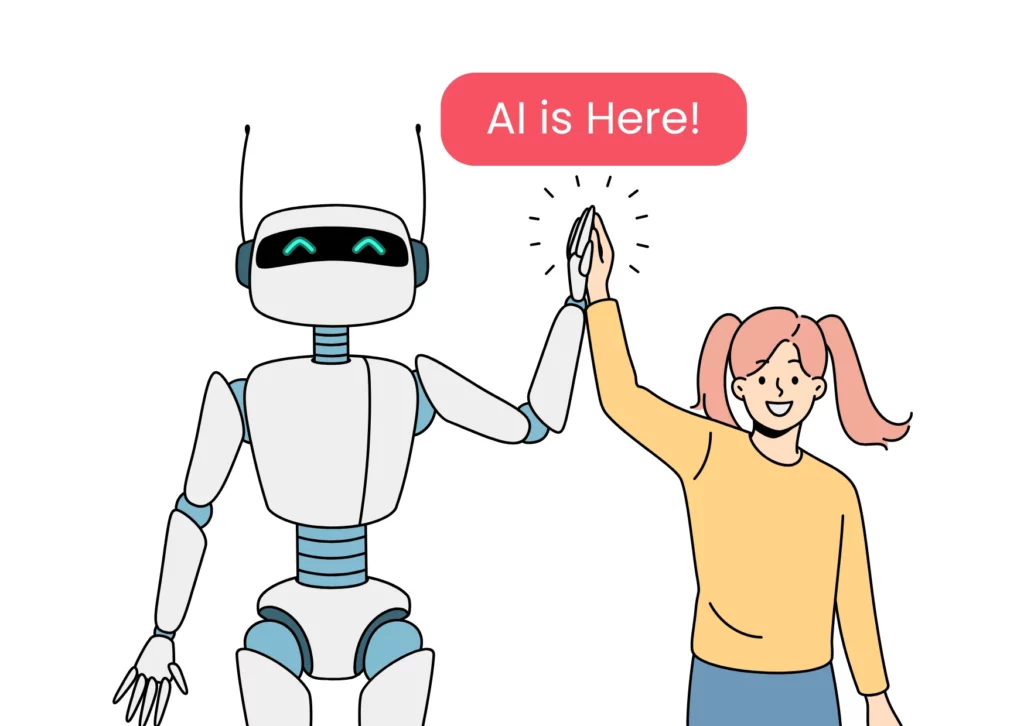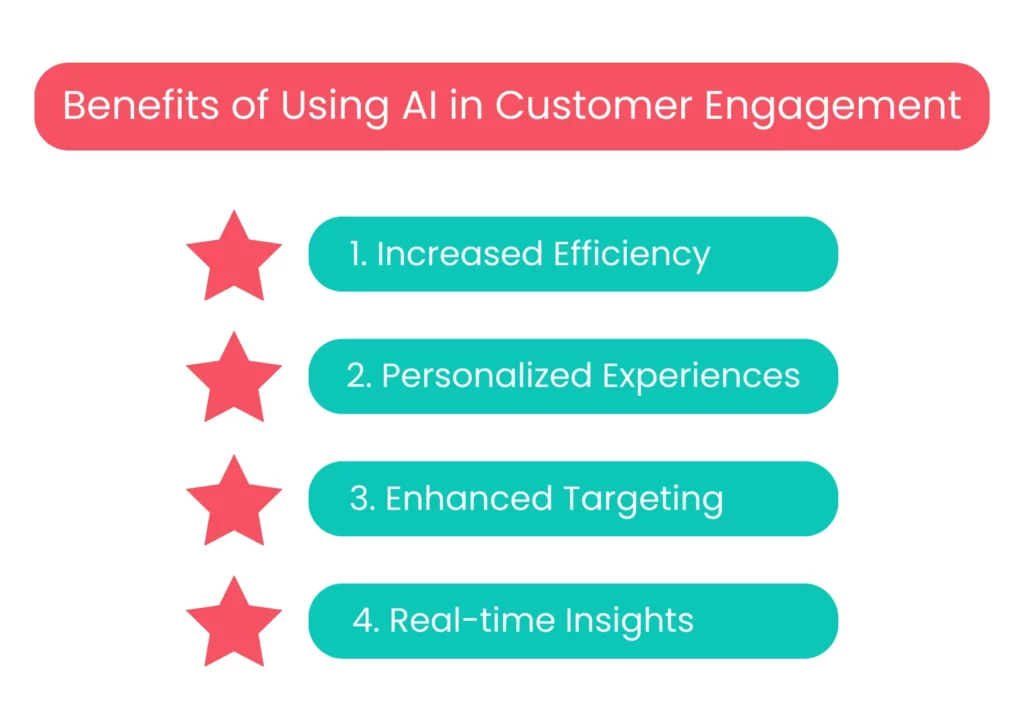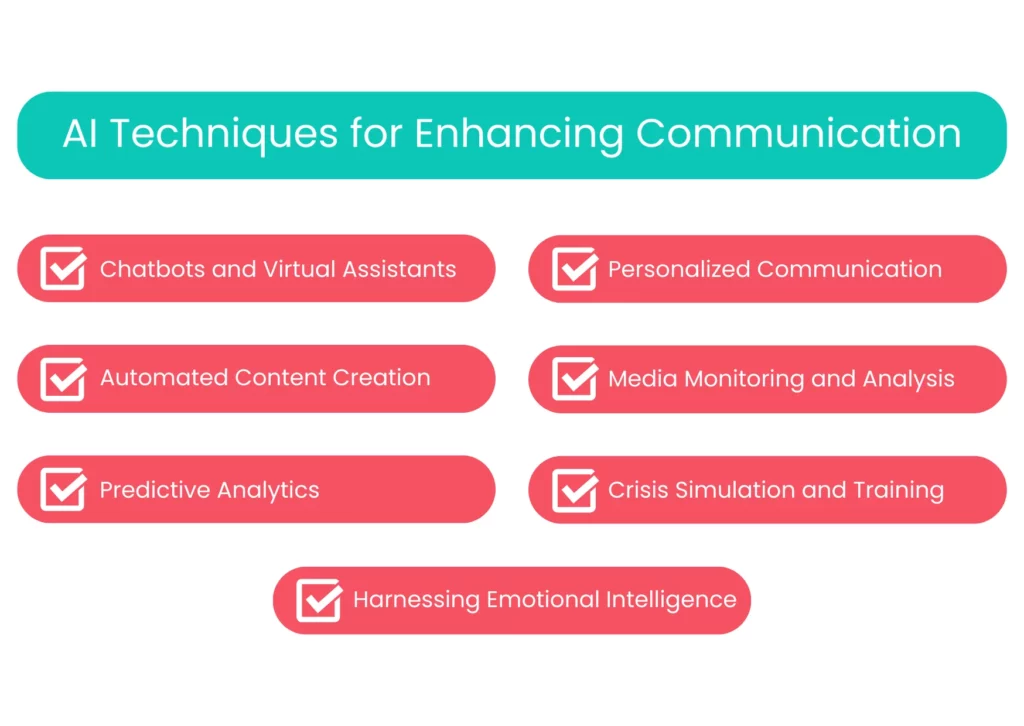
Artificial Intelligence (AI) is revolutionizing customer engagement in digital marketing. AI is changing how businesses connect with their customers. AI tools help create personalized and efficient experiences by analyzing large amounts of data to understand what customers want and need.
Imagine having a virtual assistant or chatbot available 24/7 to provide quick customer support. This boosts customer satisfaction and loyalty. Predictive analytics help businesses anticipate customer needs, allowing them to offer personalized content, deals, and recommendations. AI also helps adjust prices in real-time based on demand and competition, optimizing revenue while keeping customers happy. Automated content creation tools ensure that marketing materials are engaging and consistent across all channels, building stronger customer relationships.
In a competitive digital landscape, AI technologies are not just improving digital marketing—they’re transforming it, driving growth, and setting new standards for customer engagement.
Table of contents
What are AI Communication Tools?

AI communication tools are advanced software applications that leverage artificial intelligence to enhance and streamline communication processes. These tools can analyze large datasets, identify patterns, and perform tasks automatically, reducing the need for human intervention.
AI communication tools act as your digital champions. They are smarter, faster, and incredibly intuitive. By utilizing AI and machine learning, these tools can handle routine tasks, translate languages instantly, and even anticipate your needs.
Consider chatbots that effortlessly handle customer inquiries or virtual assistants that efficiently manage your schedule. AI communication tools simplify complex interactions and make global collaboration more efficient and seamless.
The Revolutionary Effect of AI on Communication
Why is the impact of Artificial Intelligence on communication so important? To begin with, AI-powered tools can analyze large amounts of data to provide valuable insights, enhancing both business communication and internal communication. This ensures that your message is not only sent but also understood and acted upon.
The rise of AI-driven writing assistants has changed the way we create and manage content. From drafting blog posts to generating reports, these assistants ensure clear and precise communication while easily integrating with platforms like Google Docs and Microsoft Word. This not only increases productivity but also allows users to focus on more strategic tasks.
These tools are more than just aids; they are partners in streamlining workflows and boosting efficiency. The best part is that they can learn. Every interaction and feedback loop makes them better. It’s like having a team collaboration tool that grows with your needs, breaking down language barriers and making written communication more effective than ever.
As you explore the complexities of AI communication tools, remember that. It’s not about replacing the human touch, it’s about enhancing it. With AI, we are not just communicating; we are connecting in new and powerful ways, making every business goal more achievable and every team collaboration smoother. Let’s dive deeper into this revolution.
Benefits of Using AI in Customer Engagement

Incorporating AI marketing tools into your customer engagement strategy can bring many benefits to your business. Here are some key advantages of using AI in customer engagement:
1. Increased Efficiency
AI can handle repetitive and time-consuming tasks automatically, giving your team more time to focus on important projects. Tasks like entering data, dividing customers into groups, and generating responses can be managed effortlessly by AI. This leads to greater productivity and faster response times, making your overall operations run more smoothly and improving the customer experience.
2. Personalized Experiences
AI helps businesses deliver personalized experiences by analyzing customer data. By understanding each customer’s preferences, behaviors, and purchase history, AI can create messages and content that meet specific needs. For example, AI can provide personalized product recommendations, targeted promotions, and customized email content, which can significantly increase customer satisfaction and loyalty. This personalized approach makes customers feel valued and understood, leading to stronger relationships and increased retention rates.
3. Enhanced Targeting
AI allows businesses to divide their audience into groups based on factors like age, behavior, purchase history, and preferences. This targeted approach ensures that you reach the right people at the right time with the most relevant content. By delivering more accurate marketing messages, businesses can see higher conversion rates and a better return on investment (ROI). Enhanced targeting also means fewer resources are wasted on ineffective campaigns, allowing for more efficient use of marketing budgets.
4. Real-time Insights
AI provides businesses with real-time information about customer behavior, preferences, and trends. This immediate feedback allows for data-driven decisions and the ability to quickly adapt marketing strategies to changing circumstances. For example, if a particular campaign is not performing well, AI can identify the problem and suggest changes in real time. This flexibility ensures that marketing efforts are always optimized for maximum engagement and results. Additionally, real-time insights help businesses stay ahead of market trends and anticipate customer needs, encouraging a proactive approach to customer engagement.
AI Techniques for Enhancing Communication

AI is a powerful tool that can change how organizations communicate with their audiences. Let’s explore some key ways AI can enhance communication in your organization.
1. Chatbots and Virtual Assistants
AI-powered chatbots and virtual assistants, such as FAQ bots, change communication by providing quick responses and simulating human conversations. These tools help users and provide relevant information quickly, freeing up human resources for more complicated tasks and improving overall communication efficiency.
Using the right AI-powered virtual agent software can reduce response times and resolve queries faster. These advanced platforms can mimic a human tone while keeping the speed and efficiency of regular chatbots. This is done through:
- Tone Moderation: Examining customer interactions to detect emotions and sentiments, adjusting its response tone from formal to friendly as needed.
- Real-time Assistance: Giving support agents real-time suggestions and information during live interactions, ensuring they have all the necessary data to resolve issues efficiently.
2. Automated Content Creation
AI’s ability to generate content quickly streamlines the production of press releases, articles, and social media posts. By analyzing data patterns, AI algorithms create content that matches the brand’s voice, ensuring consistent, high-quality output and a more flexible communication strategy.
For example, during a crisis when quick and accurate communication is crucial, AI-driven content generation helps PR professionals produce timely and relevant messages. This ensures that the content aligns with your brand’s voice, protecting your brand’s reputation, addressing crises promptly, countering misinformation, and maintaining control over the narrative during difficult times.
3. Predictive Analytics
AI uses predictive analytics to help PR professionals foresee and prepare for potential challenges by analyzing past data and identifying patterns. This foresight allows teams to adjust their communication strategies in advance, ensuring a more proactive and effective crisis response.
By using analytics, PR teams can handle crises more effectively, making informed decisions, reducing risks, and maintaining a strategic approach to crisis communication. Predictive analytics turns data into a powerful tool for crisis management and strategic decision-making.
4. Personalized Communication
AI’s ability to analyze large amounts of user data is essential for personalized marketing communication. Understanding individual preferences allows the teams to customize crisis communication strategies, ensuring messages resonate with specific audience segments. This personalized approach not only increases customer engagement but also builds a more meaningful connection between the brand and its stakeholders during tough times.
Custom messages can address concerns more directly, effectively counter misinformation, and show a higher level of empathy, leading to better crisis communication outcomes.
5. Media Monitoring and Analysis
AI-driven media monitoring tools are excellent at real-time tracking of media channels, giving the teams instant insights into public sentiment. By analyzing mentions, comments, and trends across platforms, AI helps evaluate the effectiveness of communication strategies, allowing for quick adjustments based on current sentiment and public perceptions.
6. Crisis Simulation and Training
AI supports crisis simulation, providing a controlled environment for the teams to practice and refine their crisis communication strategies. Proactive training ensures preparedness for real crises, identifying potential issues, and improving responses. Simulations also test the effectiveness of crisis communication plans.
7. Harnessing Emotional Intelligence
AI technologies analyze voice tones and sentiments in communication channels, offering deeper insights into how audiences perceive a brand or specific messages. By understanding emotional nuances, professionals can adjust their messaging to get desired responses, creating a more impactful and effective communication strategy.
For example, in a recent incident involving Tesla, the company faced a PR crisis about safety concerns with one of its vehicle models. In response, Tesla quickly used AI technologies for voice recognition and sentiment analysis across various online platforms. By studying the tones and sentiments expressed by the public, Tesla gained a clear understanding of the emotional nuances surrounding the issue. This AI-driven insight allowed the company to tailor its crisis communication strategy, addressing concerns, providing factual information, and showing a commitment to safety.
AI-Powered Communication Tools
- FreshDesk: FreshDesk serves businesses of all sizes with its strong ticketing system that connects easily with all communication channels, ensuring no customer query is missed. From prioritizing tickets to encouraging team collaboration, FreshDesk ensures your customer support system grows with you, making every customer journey smooth and every interaction delightful.
- Salesforce Einstein: Salesforce Einstein is not your average AI tool; it’s a visionary, blending AI models with CRM data to provide insights like never before. Ask it anything in natural language, and watch as it generates content that changes with your customer’s needs. With Einstein, Salesforce isn’t just managing relationships; it’s predicting the future of customer service.
- Taskade: Taskade is a great example of AI in workflow management, changing how teams collaborate. It’s a platform where simplicity meets sophistication, allowing teams, whether remote or onsite, to work together seamlessly. Taskade offers a dynamic workspace where tasks, notes, and real-time communication come together, powered by AI to automate and streamline processes.
- Zendesk: Zendesk stands out with its complete ticketing and automation features, favored by small and medium-sized businesses worldwide. It combines various service support tools into a single, cohesive record, offering a complete view of operational efficiency. With Zendesk, live chats, knowledge bases, and analytical insights are not just features; they’re building blocks for lasting customer relationships.
- Zoho Desk: Zoho Desk uses AI-powered responses and prioritizes tickets that need urgent attention, ensuring your customers aren’t just heard but understood. Imagine having a user interface with a multilingual assistant ready to manage emails, knowledge bases, and even mobile queries. Zoho Desk does this and more, turning customer service from a task into an experience.
Conclusion
To sum up, AI tools for communication are transforming how we connect and do business. They not only make things more efficient but also help build stronger relationships within teams and with customers. By giving immediate feedback and generating new ideas, AI tools are changing how we talk to each other. They learn from interactions to provide more personalized and effective ways of communicating.
As we adopt these advancements, we look forward to a future where communication is seamless, intuitive, and highly productive. The potential of AI to reshape communication is truly remarkable.